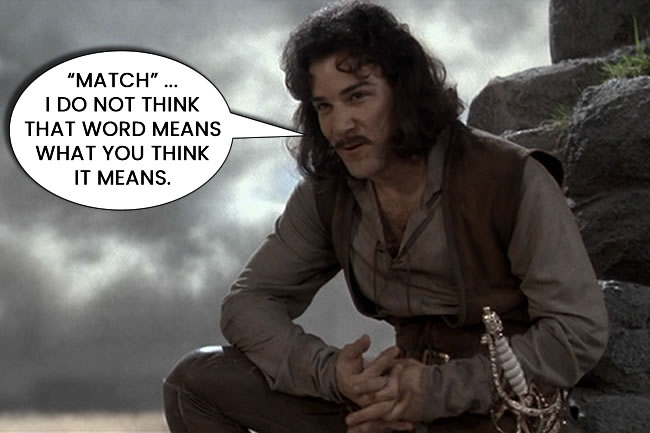Well … Google’s at it again.
They announced yesterday that they’re changing again what the word “match” means.
Once upon a time you could bid on an exact match term like [blue tulips] and the crazy thing was … your ad would only show up if someone searched for …

blue tulips
It was a crazy time when words meant what they meant and ads were triggered when they were supposed to.
That ended in 2014 when exact match was expanded to include close variants and misspellings. It got even more skewed in 2017 when the word order stopped mattering.
Now, you may ask why that really matters. Aren’t they essentially the same thing?
Not always and even when they are, you didn’t state you wanted it so in my opinion, it shouldn’t be delivered. If I ordered a burger and was delivered a pizza I’d be upset. I like pizza … a lot … but that’s not what I ordered.
But perhaps more importantly, let’s consider a term like [blinds]. Clearly I’m wanting to advertise to folks who would like to purchase some window dressings and not people looking for information on the medical condition. And yet …

This is far from the only example and many are more subtle. Service vs services is a favorite of mine. I would advertise differently to someone looking for a single solution than someone potentially looking to compare options. Or perhaps better said, I would have …
What Are They Up To Now?
In the announcement Google stated that in the coming weeks they will be pushing this further and applying close variants to modified broad match and phrase match.
According to their example we’d see:
And for phrase match:
Which seems all well and good for the most part but we’re being told we need to trust entirely what Google decides a close variant is. Do you?
So Why Are They Doing It?
The obvious answer here is money. They’re estimating that you will get 4% more traffic. You can read this as 4% more revenue for Google from these match types than they were getting before. I expect we’ll see some decent revenue numbers in the coming quarters.
Probably not for you or your CPA though.
What Does This Mean For You?
There are a few things you’ll now need to do. At least, that I’m pretty sure will apply at the time of this writing but it hasn’t rolled out yet so it may change. Stay tuned.
The main area I expect I’ll be monitoring moving forward is the search queries reports. It’s always a good idea and I do it regularly, but now it’s with a different purpose.
As part of this update and in their benevolence, the Google Ads team is letting us “Maintain control and flexibility” by showing the most relevant option. So, if a query matches two ad groups and one keyword is closer to the actual query, they will show that one.
This means that you may need to create new ad grounds to ensure you have control over the ad phrasing of the queries you’re now appearing for.
This isn’t necessarily bad as it’s forcing you to capture new traffic but if you’re already spending your budget or close to it, it’s added work with little return.
More important will be the monitoring for queries that are considered a close variant that don’t apply. While it’s always a good idea to periodically watch your queries for phrases that don’t meet your goals and add them as negatives, as Google broadens the queries your ads will be triggered for, this is even more important.
You’ll also want to watch your use of keyword injection during this transition as it may make your ads appear relevant for queries that they are not.
The problem with having to monitor your search queries is that you may have already paid for the click. Methinks that’s part of the plan.
Or maybe they’re really just thinking of you and donating that extra 4% to charity.
